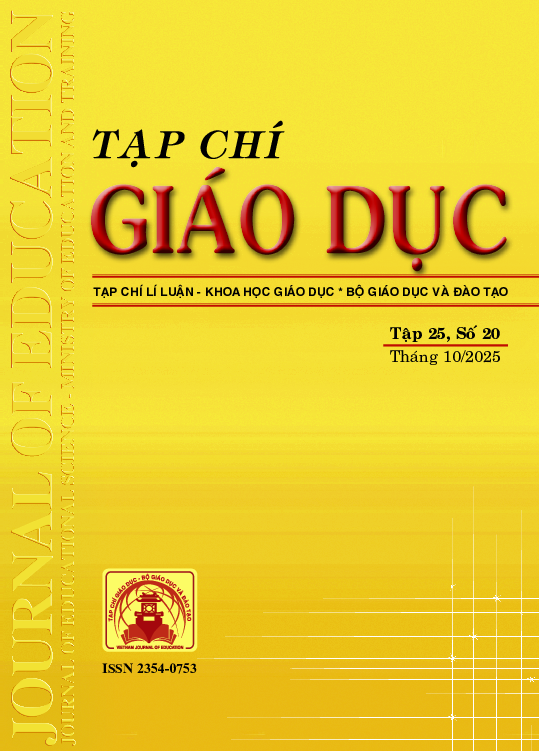Nghiên cứu chính sách đưa giáo dục AI vào giáo dục phổ thông của một số nước và đề xuất cho Việt Nam
Tóm tắt
A comprehensive review of approaches to artificial intelligence (AI) education in K-12 systems across selected countries such as the United States, China, Canada, Germany, and Singapore allows us to learn from effective models, stay updated with global trends, and develop policies tailored to our national context. This, in turn, enhances education quality and prepares a digital-ready workforce for the future. The study reveals that while some countries choose to introduce AI as a standalone subject, many others integrate AI content into existing subjects such as Mathematics, Science, Technology, and Computing. AI education content not only covers technical knowledge but also addresses ethical, social, and critical thinking aspects related to AI. These findings suggest that AI education in Vietnam should be implemented promptly, based on the realities of the national education system. The process should begin with developing a national AI literacy competency framework for K-12 education, followed by integrating AI content into subjects, and establishing networks that connect schools with technology experts to ensure effective implementation.
Tài liệu tham khảo
AI for All (2025). State AI Guidance for Education. https://www.aiforeducation.io/ai-resources/state-ai-guidance
Chen, J. (2024). The Impact of the Double Reduction Policy on China’s Education and Training Market. In SHS Web of Conferences (Vol. 207, p. 04027). EDP Sciences.
Chiu, T. K., Meng, H., Chai, C. S., King, I., Wong, S., & Yam, Y. (2021). Creation and evaluation of a pretertiary artificial intelligence (AI) curriculum. IEEE Transactions on Education, 65(1), 30-39. https://doi.org/10.1109/TE.2021.3085878
Gadanidis, G., Li, L., & Tan, J. (2024). Mathematics & artificial intelligence: Intersections and educational implications. Journal of Digital Life and Learning, 4(1), 1-24.
Goode, K., Kim, H. M., & Deng, M. (2023). Examining Singapore’s AI progress. Center for Security and Emerging Technology, 19.
Government of China (2025a). Beijing to introduce AI courses across primary, secondary schools. https://english.www.gov.cn/news/202503/12/content_WS67d18e9ec6d0868f4e8f0c40.html
Government of China (2025b). New guideline stresses on AI-based education. https://english.www.gov.cn/policies/policywatch/202504/18/content_WS6801bda9c6d0868f4e8f1da9.html
Heintz, F., Loutfi, A., Larsson, P. O., Axelsson, J., Byttner, S., Eck, S., ... & Åström, K. (2021). AI competence for Sweden - A National Life-Long Learning Initiative. In EDULEARN21 Proceedings (pp. 2560-2567). IATED.
Kandlhofer, M., & Steinbauer, G. (2021). AI K-12 education service. KI-Künstliche Intelligenz, 35, 125-126.
Kandlhofer, M., Steinbauer, G., Hirschmugl-Gaisch, S., & Huber, P. (2016). Artificial intelligence and computer science in education: From kindergarten to university. In 2016 IEEE Frontiers in Education Conference (FIE) (pp. 1-9). IEEE.
Koo, S., & Liew, L. (2020). Intergenerational learning with ai for kids (ai4k) tm. In International Workshop on Education in Artificial Intelligence K-12 (EduAI-20).
Lee, A. V. Y., Koh, E., & Looi, C. K. (2023). AI in education and learning analytics in Singapore: An overview of key projects and initiatives. Information and Technology in Education and Learning, 3(1), Inv-p001.
Long, D., & Magerko, B. (2020). What is AI literacy? Competencies and design considerations. In Proceedings of the 2020 CHI Conference on Human Factors in Computing Systems (pp. 1-16).
Micheuz, P. (2020). Approaches to Artificial Intelligence as a Subject in School Education. In T. Brinda, D. Passey, & T. Keane (Eds.), Empowering Teaching for Digital Equity and Agency. OCCE 2020. IFIP Advances in Information and Communication Technology, 595. Springer. https://doi.org/10.1007/978-3-030-59847-1_1
Ministry of Education (2023). Transforming Education through Technology - Masterplan 2030 of Singapore. https://www.moe.gov.sg/education-in-sg/educational-technology-journey/edtech-masterplan
Nisheva-Pavlova, M. (2021). AI Courses for Secondary and High School - Comparative Analysis and Conclusions. In ERIS (pp. 9-16).
Ottenbreit-Leftwich, A., Glazewski, K., Jeon, M., Hmelo-Silver, C., Mott, B., Lee, S., & Lester, J. (2021). How do elementary students conceptualize artificial intelligence? In Proceedings of the 52nd ACM Technical Symposium on Computer Science Education (pp. 1261-1261).
Russell, S., Norvig, P., Popineau, F., Miclet, L., & Cadet, C. (2021). Intelligence artificielle: une approche moderne (4ᵉ édition). Pearson France.
The State of Council (2025). New guideline stresses on AI-based education, The People’s Republic of China. Online: https://english.www.gov.cn/policies/policywatch/202504/18/content_WS6801bda9c6d0868f4e8f1da9.html
The White House (2025). Advancing artificial intelligence education for American youth. https://www.whitehouse.gov/presidential-actions/2025/04/advancing-artificial-intelligence-education-for-american-youth/
Touretzky, D., Gardner-McCune, C., Martin, F., & Seehorn, D. (2019). Envisioning AI for K-12: What should every child know about AI? In Proceedings of the AAAI Conference on Artificial Intelligence (Vol. 33, No. 01, pp. 9795-9799).
UNESCO (2019). Beijing Consensus on Artificial Intelligence and Education. International Conference on Artificial Intelligence and Education, Planning Education in the AI Era: Lead the Leap, Beijing, 2019. https://unesdoc.unesco.org/ark:/48223/pf0000368303
UNESCO (2022) (bản sửa đổi năm 2025). K-12 AI curricula: A mapping of government-endorsed AI curricula. https://unesdoc.unesco.org/ark:/48223/pf0000380602_eng
UNESCO (2023). UNESCO calls for regulations on AI use in schools. https://news.un.org/en/story/2023/09/1140477
UNESCO (2024). AI competency framework for students. https://www.unesco.org/en/articles/ai-competencyframework-students?hub=83250
UNICEF (2021a). Global Forum on AI for Children. https://www.unicef.org/innocenti/innocenti/innocenti/innocenti/events/global-forum-ai-children
UNICEF (2021b). Policy guidance on AI for children Version 2.0, Recommendations for building AI policies and systems that uphold child rights. https://www.unicef.org/innocenti/innocenti/innocenti/reports/policy-guidanceai-children
Tải xuống
Đã Xuất bản
Cách trích dẫn
Số
Chuyên mục
Giấy phép

Tác phẩm này được cấp phép theo Ghi nhận tác giả của Creative Commons Giấy phép quốc tế 4.0 .












